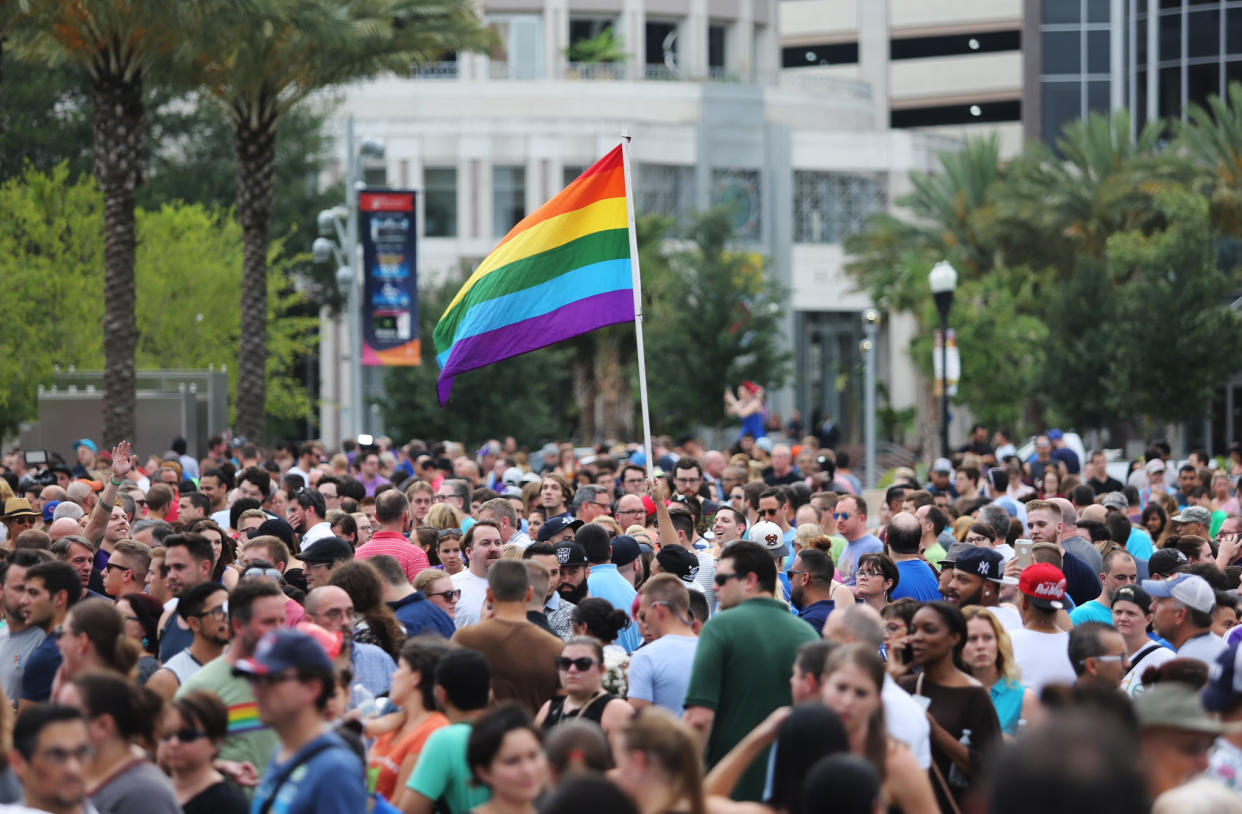Seven years ago, gunshots rang out. How will Orlando remember Pulse? | Editorial

For many of the survivors of the deadliest act of domestic terrorism since Sept. 11, it probably seems like yesterday. The night was winding down, but the music was still pounding and at first, some said, the shots sounded like part of the Latin-inspired beats. Then the music stopped and the screaming started.
The memories may be fresh and searing, but the June 12 massacre at Orlando’s Pulse nightclub occurred seven years ago tomorrow. For those who fled for their lives; for the families of those who died that night; for the first responders who surrounded and sought to breach the club over a three-hour standoff with the shooter; for the hospital staff who fought throughout what remained of that terrible night and into the day to save as many lives as possible; for countless others affected by this senseless, savage and prolonged violence: Life will never be the same.
Pictures: Pulse crosses on display at Orange history center
Hundreds will gather tomorrow for an observance of this tragedy. Thousands of Central Floridians will participate in the gentle tradition of showing extra kindness toward others in commemoration of the lives lost. It is a time to grieve anew for the young lives lost and forever altered and a time to celebrate the way this community surged toward a unity that seared acceptance into Orlando’s DNA.
It is a time to renew the determination, in the words of playwright Lin Manuel Miranda, the “remembrances that hope and love last longer — And love is love is love is love is love is love is love is love; cannot be killed or swept aside.”
Waiting for a new dawn
But we must also acknowledge that many of those who take time tomorrow to remember the Pulse tragedy are growing impatient for the long-promised permanent memorial to rise. We wish we had words to comfort them — a wish we believe is shared by the leadership of the OnePULSE Foundation as it works to bring that vision to fruition.
In January, the group said it was backing away from plans to build an architecturally grandiose memorial on the grounds of the nightclub and adjacent land it has already purchased on Kaley Street.
As the Sentinel’s Amanda Rabines reports, the current plan includes a conversion of a 47,000-square-foot building in Orlando’s SoDo neighborhood into a museum and a communal space for local LGBTQ+ nonprofits, along with a survivor’s walk that connects the memorial site to the Orlando Health campus where most of the injured victims of the shooting were taken. It’s an appealing notion that would memorialize the tragedy while honoring the wishes of some survivors, who have said they don’t want to revisit the club where so many died.
At the same time, however, the new plans will leave future visitors wondering why the grounds of the former nightclub aren’t also preserved as a lasting reminder of searing violence.
The answer to that question is growing uglier and more venial. The board of OnePULSE once intended to buy the club for approximately $2 million, but reconsidered after learning that Rosario and Barbara Poma, who owned the club, received an insurance settlement after the massacre. The Pomas have told Rabines they are willing to donate their share of the property, but point to a third owner — Daytona Beach businessman Mike Panaggio, who is a long-term friend of the Pomas and acquired a stake in the property — as a holdout.
For his part, Panaggio has been blunt about wanting to be paid for his share: “I’m outraged, but I’m not budging,” he wrote in an email to the Sentinel. “It’s a totally unholy request.”
We hope someone brings this statement to the attention of Daytona Beach city officials, who at one point entrusted Panaggio with a 30-year contract to operate that city’s landmark Municipal Stadium and still allows him to lease the facility for his own business, DME Sports Academy. Is this the kind of conduct Daytona Beach leaders should expect or tolerate from a person they’ve entrusted with a signature community asset — to profit from what should be considered sacred ground for all Floridians? What message does this send to LGBTQ residents of Daytona Beach?
We understand why OnePULSE leaders worry that past donors might be outraged that their gifts are flowing into the pockets of a Daytona businessman. At the same time, however, there may be some donors who wish the site to be preserved at any cost — and are willing to contribute, with a full understanding of how their gifts will be used. OnePULSE should offer that opportunity.
Memorials can serve many
The story of Pulse, after all, is a story of sorrowful triumph in the face of unspeakable cruelty. Of love overcoming darker emotions. Of beauty flowering from anger and pain.
The events that unfolded on that day, seven years ago, changed Orlando forever. Commemorating it in multiple ways and venues is fitting and feels right.
In the decades to come, visitors to any Pulse memorial will not care how it came to rise. They will instead focus on the unspeakable horror of that June morning — and, we hope, be inspired by the way Orlando surged to reclaim the light.
The Orlando Sentinel Editorial Board consists of Opinion Editor Krys Fluker, Editor-in-Chief Julie Anderson and Viewpoints Editor Jay Reddick. Contact us at insight@orlandosentinel.com

